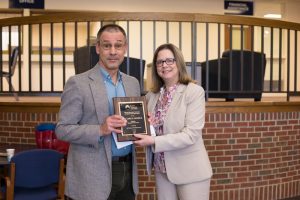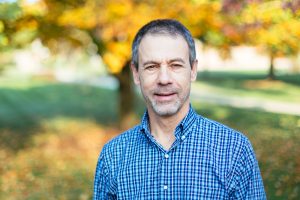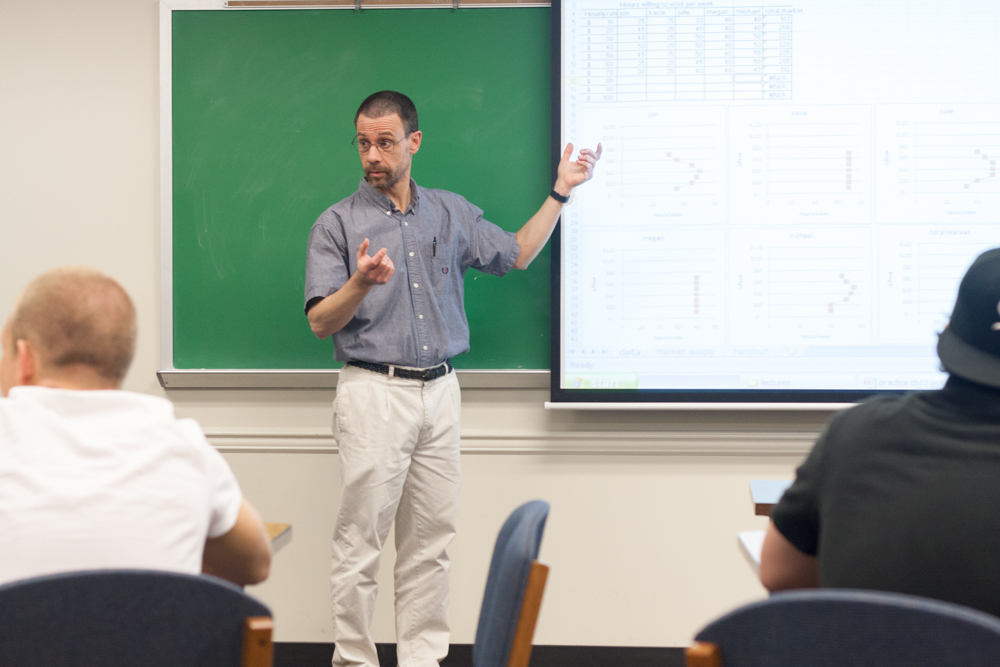Jelly beans, tennis balls and cups of coffee – these descriptors appear with regularity when former students remember Professor Chris Gingrich. The first two classroom props were used in activities to illustrate consumer behavior, the law of diminishing marginal utility, production capacities and negative returns. The cups of coffee symbolize mentorship, the kind that fostered many students into a love of the same subject and a desire to teach as well.

Ryan Swartzentruber ‘16, who recently finished his master’s degree in agricultural and resource economics at Colorado State University, says he frequently reflects on what makes an excellent educator. “I’ve concluded that Chris has pretty well hit the nail on the head.”
With a legacy of several EMU grads now teaching at large universities, “Chris has multiplied himself,” said his colleague, business professor Spencer Cowles. “Isn’t that the sign of a great teacher, to inspire a lifelong love of the subject amongst their students?”
Despite initial aspirations to work at a large, R-1 university, Gingrich chose to spend 24 years at Eastern Mennonite University, where he has enjoyed a sustainable balance of teaching and research, prioritized mentoring relationships, and anchored the economics program. He retired at the end of the spring 2019 semester, earlier than he would have liked due to health reasons.
EMU has been “a great place to come to every morning,” Gingrich said in an interview during the last week of classes. “I have always appreciated working in an academic environment with colleagues who support you and want you to do your own thing. … My students have kept me on the young side over these years and it’s been very rewarding to see them go off after graduation and be successful in their chosen field.”
The teacher
Gingrich was known among his colleagues as an astute and innovative teacher. In a tribute announcing his retirement, Undergraduate Dean Deirdre L. Smeltzer noted: “Rather than rely on past success in the classroom, Chris has demonstrated a commitment to pedagogical growth, including a willingness to try out and master entirely new teaching methods in his classes.”
Matt Gnagey ‘05, now an assistant professor of economics at Weber State University, recalls an innovative classroom game in which students acted as a cartel, accumulating extra credit points instead of money.
“The class tried over and over to collude,” Gnagey recalled, “but the incentives to forgo collusion for personal gain were strong, and just like OPEC we ended up overproducing, hurting ourselves collectively in the process. This same lesson explains many other international issues, for example why we have such a hard time mitigating climate change.”
Gingrich came to teaching as “a leap of faith,” he said. Applied research was his initial interest. From a farming family, Gingrich earned his bachelor’s and master’s degrees in agricultural economics at University of Illinois and then, with his wife, spent three years in Haiti with Mennonite Central Committee. Returning to the states, he was accepted to the doctoral program at Iowa State University. His advisor helped him find a dissertation topic: household consumption patterns in Lima, Peru.

Hired in 1995, Gingrich was EMU’s first “true blue economist,” said former EMU colleague, Professor Emeritus Rick Yoder, a specialist in international development who had worked overseas with the UN and USAID.
Cowles, then department chair, hired Gingrich for the position with a prescient sense of what he would bring to EMU. “He was the right person for the job, a true economist who enabled us to build a rigorous economics major around him and his passion and knowledge for the subject. But he was also someone who supports and cares about students.”
Gingrich, who had never taught before, says Yoder “taught me how to be a respectable teacher.” The duo shared the university’s growing economics teaching load, as several majors required at least introductory econ coursework. Gingrich would eventually teach economics in the MBA program when it began, as well as undergraduate courses in quantitative research and finance.
One of their challenges was to make class time interesting and engaging. Hence the jelly beans and tennis balls: Gingrich was adept at developing lessons “beyond lectures and other didactic methods” that encouraged unique interaction and active learning with concepts, Yoder said.
He also appreciated their many conversations about concerns and challenges, trips to economics conferences with students, and a shared perspective. “We both believe that economics is a tool to solve some of humanity’s intractable problems, such as racism and inequality.”
Solutions: The researcher
Gingrich was a prolific and exemplary scholar while balancing a heavy teaching load, Cowles said, and his research was practical and applied, “not about some arcane financial matter, but instead using his economics knowledge to reach out and make a difference in the lives of people.”
His contributions in the field of economic development and public health were part of a larger effort by EMU professors to be active contributors to their scholarly fields.
Together with biology colleague Roman Miller (now professor emeritus), the business and economics department rallied to call for the EMU administration to support release time for research projects and importantly, to become “knowledge producers instead of knowledge consumers,” Yoder said. “We use textbooks someone else wrote, articles someone else wrote and we go to conferences where other people present. … Our point was ‘Where’s the Anabaptist voice of peace and justice and equity and the common good? How do we become part of this conversation?’”
Gingrich took a two-year leave in 2001-03, working with Mennonite Central Committee in Nepal as a consultant on microcredit and microfinance. Articles about his findings, published in the Journal of South Asian Development and the Journal of Microfinance, illustrate Gingrich’s focus on applied research: the success of microfinance programs in serving the poor and the sustainability of microfinance delivery through community-based savings and credit cooperatives.
During the 2015-16 academic year, he continued research into distribution of anti-malarial bednets in Africa, as a visiting scholar at the Center for Communication Programs, Johns Hopkins University Bloomberg School of Public Health.
“A lot of research in grad school is pure theory and not much application and there’s a role for that, but the stuff I’ve been able to work on the past few years was very much policy oriented, and that feels good because I’ve been able to take economic skills and apply them to something more practical,” Gingrich said. “Hopefully we’ve shifted the debate a little bit in a different direction and influenced policy makers. Our footprint is there and I think it’s a fairly significant contribution to how to best distribute nets in a public policy debate.”
The mentor
Gingrich has enjoyed seeing the success of program alumni in academia, including Swartzentruber, Gnagey, Doug Wrenn ‘02, assistant professor of environmental and resource economics at Penn State; and Taylor Weidman ‘13, who is finishing a doctorate at Pitt. He also follows the careers of grads in business, for example, Isaac Wyse, director of revenue operations at YipIt Data in New York City, and Joe Mumaw, technical coordinator at Secure Futures, a solar business in Staunton, Virginia.
“It’s fun to meet with them, keep up with what they’re doing, see them get out of the classroom and develop their own careers,” Gingrich said. “I’ve been here long enough to see former students evolve into mature professionals in a number of different fields, which is rewarding.”
Wrenn, now at Penn State, researches urban and land use economics, unconventional energy development and impacts of hydraulic fracking. He traces his professional path directly back to Gingrich and Yoder. He added a second major in economics after after taking one of Gingrich’s classes, joined Yoder in a research project, and went to work for Mennonite Central Committee after graduation. Gingrich provided invaluable advice as he prepared his grad school application.
Gnagey, now at Weber State, says that Gingrich’s support and guidance, four years after he had graduated, helped him. Gnagey also worked for MCC after graduation; his current research builds on those ties, as he and a former MCC colleague conduct analysis of property markets in Indonesia.
And finally, to return to Ryan Swartzentruber, for a last word on Gingrich’s influence: “Chris has influenced my path in life, and I am forever grateful. He encouraged me, challenged me and been a role model to me. I’ve greatly appreciated – and benefited from – his relational attitude toward life, emphasizing people over other priorities.
Any comments posted below will be shared with Chris.

I’ve worked at EMU for many of Chris’ 24 years and always appreciated his warmth. I know numerous EMU alumni donors who name Chris as one of their most influential and beloved professors. Blessings, Chris!
I have the privilege of taking managerial economics with Chris during my MBA program. It was a tough class. And I loved it! He was a superb professor. Such a gifted teacher!
Reading this article makes me wish I had taken a class from you, Chris! What a great testament to your teaching and work. Congratulations, Chris!
Congratulations Chris! I remember enjoying being in one of your classes back in the early ’90’s (maybe your first year teaching?) I still remember the joke you made about “pick your Poisson”…. :-)
CONGRATS ‼️ILLINI & CYCLONE‼️
Bill